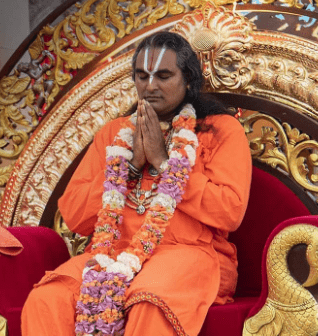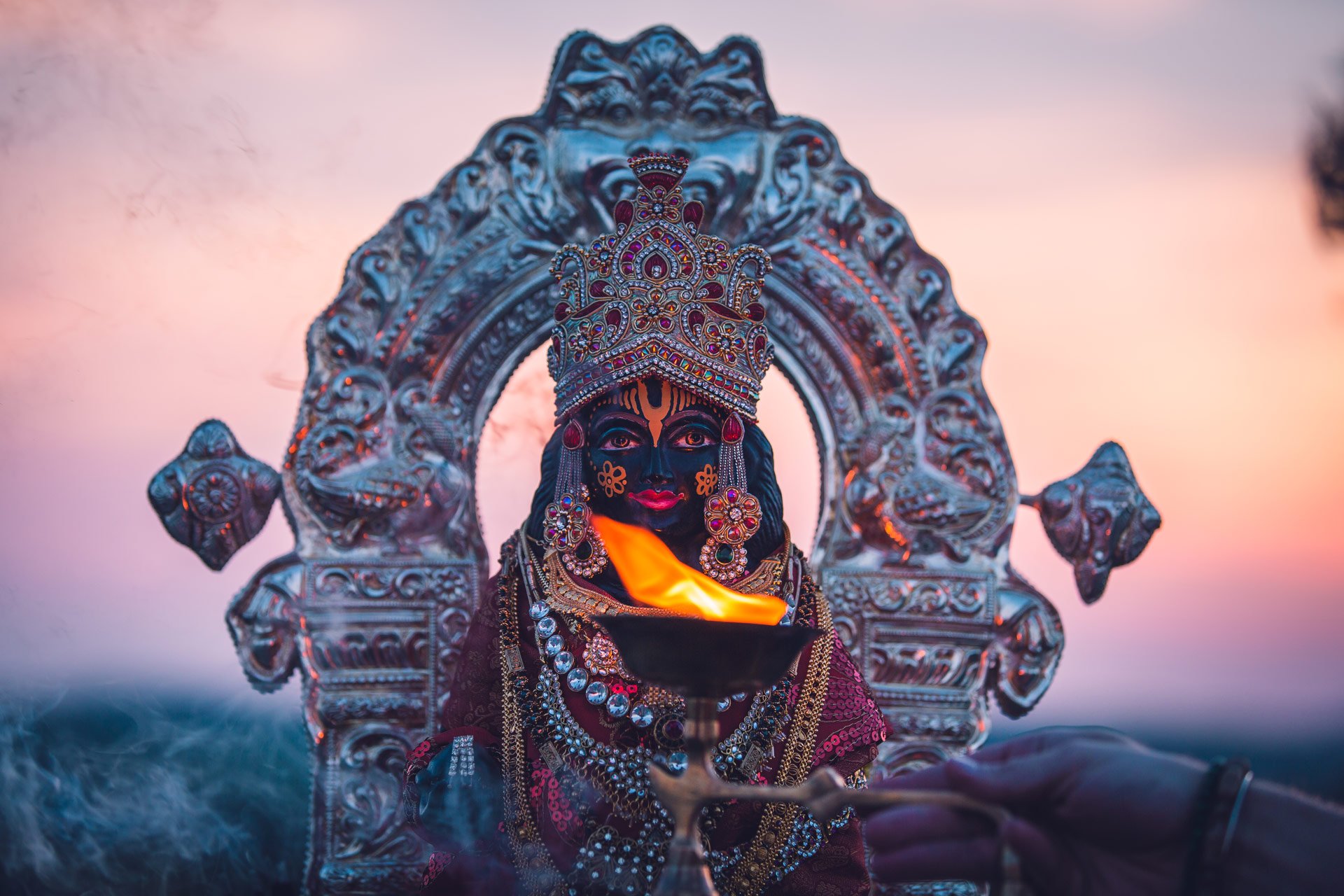Who is God?
Understanding the Nature of God
As we have already mentioned, Hinduism perceives God everywhere, in everything and in all aspects of life. This is primarily why Hindus worship the Divine in so many different forms and deities and in such a variety of ways. Nonetheless, even within the same theological spectrum of Hinduism, different schools of thought offer different interpretations as to who God is. For instance, the Advaita Vedanta philosophy states that God is impersonal, without any form or attributes. According to this view, creation is an illusion that hinders the individual soul from perceiving its true nature as God. The ultimate goal is for the soul to reach this state of realisation and merge with God completely, attaining a state of absolute oneness with Him. On the other hand, our philosophy as Vaishnavas of the Hari Bhakta Sampradaya clearly contradicts this approach.
For us on the bhakti path, God is personal and He has a form. According to Paramahamsa Vishwananda, 'out of all deities, Love is the highest. This Love has a form, that form is Sriman Narayana.' For us, God is Narayana and our goal is not to merge with Him but to serve Him in an eternal loving relationship.
'Arjuna says: Y
ou are the Supreme Brahman, the Supreme Abode, the Supreme purity, the One permanent, the Divine Purusha, Narayana Himself, the unborn, the all- pervading Lord.' -Bhagavad Gita 10.12
The Hari Bhakta Sampradaya is based upon the Vishishtadvaita Vedanta philosophy which was established by the great Vaishnava acharya, Ramanuja as part of his Sri Sampradaya. Ramanuja founded the Sri Sampradaya as an alternative response to the aforementioned Advaita Vedanta approach of absolute oneness.
Vishishtadvaita Vedanta is the philosophy of the ‘qualified oneness’. According to this Vedanta, reality is one, but it is qualified – one as an organic unit but distinct in its parts. In other words, Narayana (God) is all that exists but creation and all living beings are like infinitesimal parts of His body. Therefore, diversity in creation is not an illusion.
The same way a human body consists of various different parts, the body of God consists of different parts made of the individual souls and creation. The same way the hand cannot exist irrespective of the body but only exists in service of it, we cannot exist irrespective of God. As a result, the aim of life is not for the individual soul to dissolve its identity into God but to be His eternal servant and to realise the highest state of having a relationship of Love and devotion to Him.
'Ther
e is nothing higher than Me, O Arjuna. All of this rests upon me like pearls on a thread.' - Bhagavad Gita, 7.7
The Bhagavad Gita highlights the nature of God in-depth, how to relate to Him, and the nature of this world. It answers questions we all ask about the purpose of life and how to live. Discover the answer to how to live without attachment by downloading the audio below!
Who are God & Paramahamsa Vishwananda
For the Bhakti Marga devotee, guru-bhakti is the main foundation our tradition is built upon which means that for us Paramahamsa Vishwananda is the supreme authority. In most Hindu traditions the role of the guru is that of a mediator between God and the individual soul.
The guru is the one to guide us on the path towards God. However, in our sampradaya we have the concept of Guruji-tattva. In this case, the guru is both the mediator and a direct incarnation of God.
Therefore, for us Paramahamsa Vishwananda is both the guru but He is also Narayana Himself, incarnated in the form of the guru. This truth one can only be grasped through direct experience. The more we grow as devotees on the path, the more we witness innumerable miraculous instances which let us witness who Paramahamsa Vishwananda truly is. Otherwise, it is very challenging for the mind to accept the idea of a living Master that appears so humane and limited to be the Supreme.
At this point, it is important to point out that our sampradaya, under no circumstances, claims that God can only be found in Paramahamsa Vishwananda. God is infinite in His expressions and can be found by any seeker who sincerely longs for Him. Paramahamsa Vishwananda, whether seen as the Ultimate or simply as a God-realised Master is undoubtedly a figure who can open the hearts of people and help them grow in love and devotion on their journey towards God.
'The cosmic splendor and beauty of Sriman Narayana, is amalgamated with the divine awakening that is experienced with Paramahamsa Vishwananda. Gradually as we advance, the two become indistinguishable one.' - The Hari Bhakta Sampradaya Siddhanta
A Personal Relationship with God
Bhakti Marga holds a very personalist view of God. God is neither formless, nor far away. He carries the form and name of Sriman Narayana; He is the source of all creation and He pervades all creation. The bhakti path is all about discovering our unique relationship to God and rising in Divine Love. This personal approach to God creates several implications for our lives as it permeates all aspects of them and shows up clearly both in our lifestyles and spiritual practice.
- In Rituals: As Paramahamsa Vishwananda often reminds us, we cannot have a relationship with air, we need a form to build a relationship. By worshiping a form of God outside of us, we develop a relationship with the Divine and by doing so we also discover the Divine within us.
- In Yoga: Yoga is not just meditation and physical exercise. When we practice Babaji Surya Namaskar, japa, Atma Kriya Yoga or any other technique given to us by Paramahamsa Vishwananda, our focus is always on the form of God and we constantly chant His name. The sole aim of all these techniques is to awaken the bhakti in us and help us enter this deep state where the only thing that exists is our loving-relationship to God.
- In Scriptures: As Paramahamsa Vishwananda often says, when you love somebody, you want to learn everything about them. Likewise, through the scriptures that we learn about the life and pastimes of the Lord who is our Beloved. Also, in scriptures like the Bhagavad Gita, the Bhagavatam and the poetry of the Alvars, we find ourselves, our journey in life and our unique relationship to the Divine. These stories are continuously happening as they take place within each one of us and they transform us inside.
- In Life: When God is personal, He can be perceived everywhere – in every aspect of our lives. Every situation, every interaction, every thought, every emotion is Him talking to us. It Is the Supreme Soul reaching out to the individual soul. We all exist merely for the sake of this relationship, for Divine Love to be able to experience itself. Everything is God and everything is this eternal loving relationship. This relationship can only be experienced here, in this existence, on this Earth. When we perceive life this way, nothing is the same anymore. Life has transformed into a cosmic dance between us and Narayana.
'You think you are longing for Him? No, He is longing for you. You think that you love Him? Your love is like a grain of dust, but His love is like an ocean. You think you are walking towards Him? No, He is running towards you.' – Just Love: A Journey into the Heart of God, Paramahamsa Vishwananda

The Bhagavad Gita highlights the nature of God in-depth, how to relate to Him, and the nature of this world. It answers questions we all ask about the purpose of life and how to live. Discover the answer to how to live without attachment by downloading the audio below!









